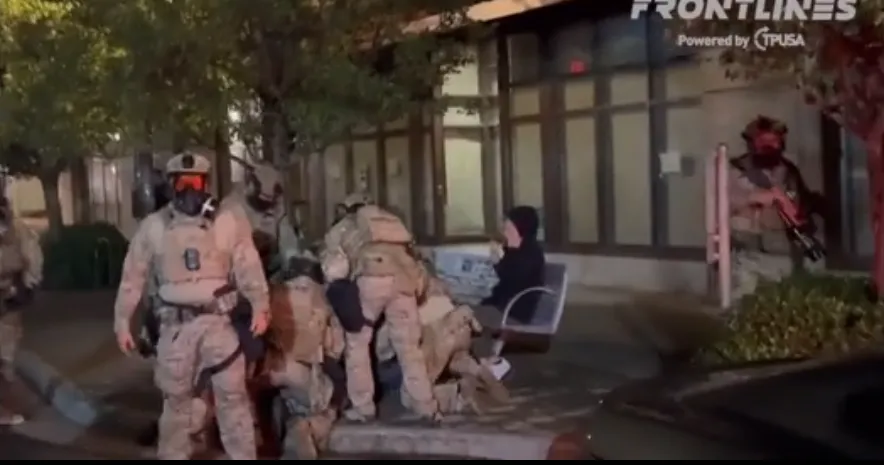Author’s Note: An earlier version of this article referenced a video as recent evidence of federal operations in Portland. That video was later confirmed to be from 2020. This update focuses exclusively on verified reports, official statements, and documented deployments. The central reporting on Trump’s September 30 remarks, National Guard mobilization, and ongoing legal challenges remains unchanged.
Trump’s Call for Military “Training Grounds”
On September 30, President Donald Trump addressed 800 generals at Marine Corps Base Quantico, proposing that America’s largest cities be treated as “training grounds” for military forces.
“I told Pete [Defense Secretary Pete Hegseth], we should use some of these dangerous cities as training grounds for our military. National Guard, but our military, because we’re going into Chicago very soon,” Trump said.
Also Read
He specifically named Portland, Seattle, San Francisco, Los Angeles, and New York as cities he would “straighten out one by one.” His speech framed domestic unrest as “an invasion from within,” arguing that internal enemies posed a greater challenge than foreign adversaries.
Federal Deployment in Oregon
Federal presence in Oregon has surged since Trump announced on September 27 that 200 National Guard troops would deploy to Portland. This decision came despite firm objections from Governor Tina Kotek, who called the action “unlawful and unwarranted.”
Trump emphasized that “quelling civil disturbances” was now the military’s top domestic priority. The White House issued a statement claiming Portland’s ICE facility faces nightly attacks with “battering rams, explosives, and assaults on officers.”
State officials sharply dispute this. Governor Kotek and Portland Mayor Keith Wilson argue the city remains stable, with police reports showing only minor isolated protests. Portland Police Chief Bob Day said demonstrations are confined to a single city block within the city’s 145 square miles.
A Clash of Narratives
Text messages between Trump and Kotek reveal deep divisions. When Trump cited violence, Kotek fact-checked him with Portland Police, who confirmed minimal activity. “You broke your promise to speak with me before taking further action,” she wrote.
Despite state resistance, Oregon Public Broadcasting reported that 100–150 additional agents arrived September 26 in Mine-Resistant Ambush Protected vehicles more commonly seen in war zones. Witnesses describe agents in tactical gear positioned on rooftops and using unmarked vehicles across Portland.
Expanding Federal Operations
Reports of similar deployments have emerged in other U.S. cities:
-
Chicago: On September 28, armed agents patrolled downtown, followed the next day by reports of an early morning apartment raid involving Black Hawk helicopters.
-
Seattle: In April, 50 masked agents detained 37 workers during what became the largest Trump-era immigration raid in Washington State.
-
San Francisco: Since May, ICE has detained at least 26 people outside immigration hearings. On August 8, two U.S. citizens were reportedly detained for 2.5 hours without explanation.
These actions highlight what critics describe as an expanding federal security campaign operating largely outside state control.
Legal Challenges and Constitutional Questions
Civil liberties groups and legal experts warn that these deployments risk violating the Posse Comitatus Act, which prohibits the use of federal military forces in civilian law enforcement.
Oregon Attorney General Dan Rayfield filed suit September 28 to block Trump’s orders, calling his description of Portland as “war-ravaged” a “wildly hyperbolic pretext.”
A federal judge recently ruled Trump’s earlier deployment of the National Guard in Los Angeles unconstitutional, writing that the administration was “creating a national police force with the President as its chief.” Legal scholars stress that the Insurrection Act permits military intervention only in cases of rebellion, invasion, or where states cannot enforce federal law. None of those apply to Portland.
The lawsuit will be heard in federal court October 4, where Oregon seeks a temporary restraining order.
Civil Liberties at Stake
Critics warn that Trump’s framing of “the enemy from within” dangerously blurs the line between policing and warfare.
The ACLU’s National Security Project Director Hina Shamsi said Trump’s rhetoric is “blatantly false and inflammatory,” designed to “sow fear and intimidate people from exercising constitutional rights.”
Adding to concern are recent Supreme Court rulings. In Noem v. Vasquez Perdomo, the Court upheld ICE’s authority to arrest based on ethnicity and language. Commentators argue this effectively legalized racial profiling, further emboldening federal agencies.
The Cost of Federal Expansion
The 200 Oregon Guard members authorized for Portland carry a 60-day, $3.8 million price tag. Trump has signaled broader expansion, naming additional target cities including Baltimore, Oakland, and New York.
The Department of Homeland Security has even launched a new recruitment program—“Defend the Homeland”—offering $50,000 sign-on bonuses to expand the federal agent workforce. Officials describe this as the largest immigration enforcement effort in U.S. history.
Calls for State Resistance
Opponents argue that states are not powerless. Oregon’s attorney general has already sued, but activists are urging direct state prosecutions of federal agents.
Under Oregon law, they argue, assaults by federal officers against protesters could be prosecuted as state crimes, beyond Trump’s power to pardon. Historical precedent exists: Northern states prosecuted federal marshals during slavery for exceeding their authority.
Legal scholars suggest that such prosecutions, even without convictions, could deter unlawful violence by signaling that state authority will be exercised.
Conclusion
Trump’s explicit call to use cities as military “training grounds” marks a dramatic escalation of federal presence in civilian life. State leaders, legal experts, and civil rights advocates argue this not only violates the Posse Comitatus Act but also undermines constitutional protections of speech, assembly, and due process.
With lawsuits pending, Guard members already deployed, and reports of escalating raids across major cities, the conflict between federal power and state sovereignty is reaching a constitutional breaking point.












